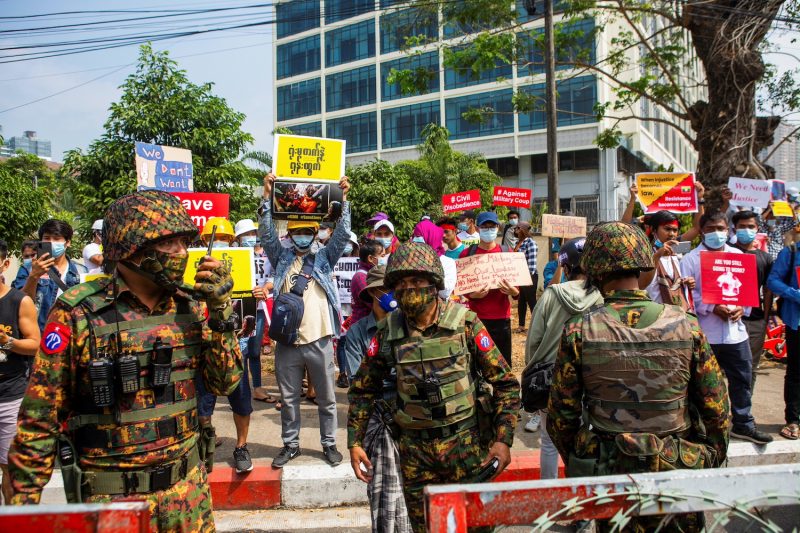(AF) Business and normal life in Myanmar is in disarray. Deep and widespread opposition to the coup imposed by the military at the beginning of the month has led to a nationwide civil disobedience movement that has disrupted major sections of the government and the economy.
Services at many banks, public hospitals and the state railway have been seriously disrupted, while work at Chinese businesses, such as copper mines, has been suspended after thousands of workers – angry at Beijing defending the military at United Nations forums, by describing the coup as an “internal affair” and blocking harsher international responses – have walked off the job.
“Many hospitals, banks, municipal departments and other government offices have been deserted as their employees have joined the growing civil disobedience movement, staying at home or urging other civil servants to join the movement by taking part in anti-coup protests,” Irrawaddy news-site reported yesterday.
The coup leader, Senior General Min Aung Hlaing, has urged medics to return to work at government hospitals, but they have refused and are referring new patients to the limited number of army hospitals while treating only serious cases. Pathein General Hospital in the Ayeyarwaddy delta has shut down, and the deputy minister of Health has reportedly gone into hiding.
In Naypyitaw, the new capital up in the ‘Dry Zone’, hundreds of staff from the Commerce, Electricity and Energy, Transport and Communications, Agriculture, Livestock and Irrigation ministries walked out last week, while “99% of railway employees” are on strike, it said.
Meanwhile, hundreds of people rushed to withdraw cash from the military-owned Myawaddy Bank in Yangon this week after protesters called for a boycott of their businesses. Withdrawals were limited to 5 million kyats (US$3,550) but branches closed because of the large number of customers and concerns about Covid-19.
Anti-China Protests
Work has also been suspended at copper mines in Monywa after 2,000 miners from the Kyisintaung mine joined the civil disobedience movement last week. Thousands more stopped work at Letpadaung copper mine in Sagaing region, which was the scene of notorious protests in 2011 and 2012.
Thousands of anti-coup protesters have also been rallying outside the Chinese Embassy, angry at Beijing’s failure to condemn the coup, despite the fact that Beijing has long been a close ally and supplier of weapons to the Tatmadaw, as Myanmar’s military is known.
There has also been speculation that China has helped the military to build internet firewalls and help them access people’s personal data. A series of cargo flights arrived in Yangon from Kunming in southern China last week, although China has reportedly said “they were only carrying goods like seafood”.
The Chinese Ambassador to Myanmar Mr Chen Hai totally rejected these claims in comments he gave to the media on Monday, saying “rumours of Chinese aircraft transporting technicians to Myanmar, China helping Myanmar building an internet firewall, and Chinese soldiers appearing on the streets of Myanmar… are completely nonsense and even ridiculous accusations”.
Ambassador Chen said: “China supports the mediation efforts by ASEAN and the Special Envoy of the UN Secretary-General on Myanmar… The military and the political parties are all members of the Myanmar family, all of whom should take the historical responsibility of maintaining national stability and development. What Myanmar needs is reconciliation and unity, instead of confrontation and division, which, we believe, is the common wish of the Myanmar people.
“At present, Myanmar faces a severe domestic situation, of which confrontations may be further intensified. We hope all parties could stay calm and restrained, refraining from doing things that may intensify conflicts and escalate tensions. Under the current situation, violence should be avoided, and basic rights of people need to be protected.”
Link to Rakhine is Beijing’s Key Goal
Experts who discussed the coup at a panel in Bangkok on February 10 also noted that China has good ties with Suu Kyi’s National League for Democracy and was likely to support both a civilian government, as well as the Myanmar military.
Analysts said the army’s relations with Beijing are close but cool, as it remembers China’s support for Communist rebels (until the late 80s) but suspects China has quietly supplied weapons such as surface-to-air missiles in recent years to ethnic armed groups in northern Myanmar, from the Wa in the northeast, across to the Arakan Army in the far northwest.
Security analyst Tony Davis, with IHS Jane’s, said China’s “primary focus” was the China-Myanmar Economic Corridor and establishing a link to the Bay of Bengal (where oil and gas pipelines run from Kyauk Phyu in Rakhine state up to Kunming in Yunnan).
Gwen Robinson, a correspondent for FT and Nikkei who lived in Yangon for some years, said the Chinese “don’t want a failed or imploding state” on their southern border. She was not totally surprised by news of the coup, saying relations between Suu Kyi and Min Aung Hlaing had been poor for a long time, but the Election Commission (EC) had rebuffed the military’s push for a review of voter lists after the “humiliating” results in the election last November, when their party, the USDP, won just 33 seats out of 476. The EC’s response clearly infuriated the men in green, she said.
Exact motives for the military’s action are still not fully clear. There has been speculation about the Army chief, who was due to retire in July, wanting a greater share of power in case he becomes a target of international court action over the deadly attack on the Rohingya in late 2017. But there have also been claims Suu Kyi wanted to overhaul the financial conglomerates that fund the military’s operations.
Military Defending Their Vast Wealth?
Experts believe the Army chiefs (retired and serving) have access to enormous wealth from two highly secretive military-controlled conglomerates – Myanmar Economic Holdings Ltd (MEHL) and the Myanmar Economic Corporation (MEC). These have more than 130 companies that are wholly or partially overseen by generals, according to a report by Justice For Myanmar.
These opaque groups have their tentacles in everything from beer to tobacco, to transportation, textiles, tourism and banking. But perhaps the most lucrative – and largely unregulated – is the jade trade in Kachin State in the far north, which is said to be worth many billions of dollars a year. Only a small part of that amount ends up in state coffers, as the most sought-after high-quality stones are believed to be smuggled over the border into China.
Since 2011, the disaster-prone jade industry has remained “controlled by a network of military elites, drug lords and their cronies”, according to the NGO Global Witness.
An MEHL subsidiary reportedly has the largest number of jade mining licences. The company, Myanmar Imperial Jade Co Ltd, was among the three gem entities slapped with US sanctions last Thursday.
MEHL has partnerships with companies in China, Japan, South Korea and Singapore, among others. It has enriched its shareholders in Myanmar, who are all current or retired military officials, according to government filings. An Amnesty International report last September said that between 1990 and 2011, some $18 billion was paid out to them.
Junta chief General Min Aung Hlaing was reportedly one of the main shareholders and would have received some $250,000 in dividends from MEHL in 2011 alone, the report said.
Francoise Nicolas, Asia director of the French Institute of International Relations, said that for nearly half a century “the military top brass had time to enrich themselves”.
And the decade of quasi-civilian rule from 2011-21 did little to change that. But the military may have feared for its future prospects after Suu Kyi’s party won by a landslide in November, Nicolas told AFP.
“This risked endangering part of their wealth and was very probably part of their decision to launch a putsch,” she said.
With such vast sums of money involved, and protesters facing the threat of a severe crackdown from a military not afraid to act harshly, activists are now pushing for more penalties to block the generals’ access to funds.
Debbie Stothard, from the International Federation of Human rights, has urged international companies to break all partnerships with the ruling leaders, and said Singapore – the largest foreign investor in Myanmar – is key to this.
‘Singapore Must Act’
“Some top Burmese military officials have had a lot of personal investments and bank accounts in Singapore since the mid-2000s. The trend has accelerated in recent years,” she said, adding that the city-state “has leverage to act against” the army chiefs.
In the wake of the coup, the military has regained control of state companies. It now oversees the Myanmar Oil and Gas Enterprise – which has partnerships with France’s Total and the US’s Chevron – and is a hugely important asset reportedly netting nearly a billion dollars a year from natural gas sales.
So far, Japanese brewer Kirin and Singapore-based oil company Puma are the only foreign corporations to have announced they are reconsidering their operations in the country. Kirin said it would be looking for a new partner, instead of MEHL.
Total, which operates the gigantic offshore Yadana gas field, paid $257 million to the Myanmar government in 2019. It has said it would evaluate the impact of the coup, while Australia’s Woodside, which holds a stake with Total in another offshore project, said it was “monitoring the situation”.
Now, in the third week of huge protests, fears are rising about the potential for violence because of the military’s long history of brutal crackdowns on its own citizens, both in central Bamar regions, and its vast and deadly village relocation schemes conducted in recent decades against ethnic minorities such as the Karen, Shan, Kachin and Rohingya in the ‘horseshoe’ of traditional lands they occupy in the country’s east, north and west.
For most business people and foreign investors, the outlook is grim.
To try to pre-empt severe reprisals against the civilian population, Justice For Myanmar‘s Yadanar Maung is urging swift retaliatory measures. “Without definitive action now, the military will inflict more violence against the people, and democracy will not have a chance,” she said.
But others cautioned against plunging one of Southeast Asia’s poorest countries back into an economic chokehold, especially as the junta is well-versed in sanctions. Having run the country for decades under crippling embargoes, the military “will be prepared to do so again”, Myanmar-based political analyst Richard Horsey said.
“Policymakers must resist the urge to impose progressively harsher measures without clear-headed cost-benefit analysis,” he added. “Don’t inflict harm on Myanmar people for the sins of their rulers.”
- Jim Pollard with Sophie Deviller (AFP)
Note: This reported was updated on Feb 18, to add comment from China’s ambassador to Myanmar.
ALSO SEE:
Myanmar Crisis Poses Risks to Global Rare Earth Supply Chain
Foreign Firms Rush to Assess Fallout in Myanmar After Coup
























